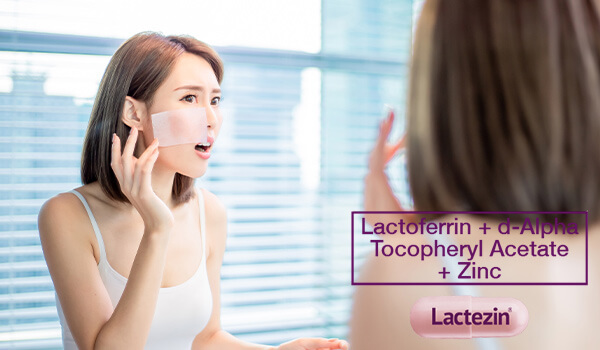5 Myths on Skincare for Oily Skin - Debunked

A lot of Filipinas deal with oily skin, no thanks to the unforgivable tropical weather. And that can come with its own set of challenges, including identifying which skincare products can effectively manage the onslaught of sebum and pinpointing fact from fiction when it comes to taking care of it.
Below, we’re setting the record straight by correcting common oily skin myths that can worsen greasy and acne-prone skin.
Myth # 1: You should wash your face more than twice a day
When you have oily skin, it’s very tempting to wash your face more than twice a day. However, there is a big difference between simply getting rid of skin impurities like sebum, bacteria, and dead skin cells ,and aggressively stripping it of its natural oils with multiple washes. The latter is called “skin-stripping” and it is a sign that you are over-cleansing. Doing so can make the skin overcompensate for the loss of oil by producing more.
Instead of running to the sink every 3 hours, stick to a daily regimen of cleansing once in the morning and once at night with a non-comedogenic facial wash that’s tough on oil, but gentle on the skin. Plus points if it contains ceramides that can help cleanse the skin without stripping it in the process. Some dermatologists even recommend using a washcloth to remove the cleanser from the skin since the natural grit of the fabric holds onto dirt and makeup particles easily and makes for a light daily exfoliation.
Myth # 2: Skip moisturizer
Skipping moisturizer may seem like the smart thing to do when you have oily skin, but it’s important to know that moisturized and hydrated skin are totally different from oily skin.
The skin needs hydration even though it’s oily and acne-prone. Omitting moisturizer from your daily regimen can lead to excess oil production since it needs to overcompensate for the lack of moisture. This will only lead to more clogged pores, frequent acne breakouts, and whiteheads.
But that doesn’t mean you have to reach for the rich and heavy cream-based moisturizers at the drugstore. The key is to look for light, gel or water-based formulations that will not only keep your oily, breakout-prone skin hydrated but will also make it look clear and smooth. There are even moisturizers that refine the look of large pores and leave behind a matte finish.
Myth # 3: Use alcohol-based products to reduce the look of oiliness
While some alcohols are safe to use on the skin, most of them aren’t. Evaporative solvent alcohols, also known as simple alcohols like denatured alcohol, ethanol, and isopropyl alcohol all have a dehydrating effect on the skin. Unfortunately, they are usually found in toners and moisturizers.
If that’s so, why do brands continue to use it in their skincare products? It’s because simple alcohols give a tight and refreshing feeling that people with oily skin would find reassuring. These are often taken as signs that the products used are working, despite the fact that they are stripping away the skin’s natural oils.
However, in certain situations, alcohols aren’t so terrible. They can be incredibly helpful when used in spot treatments since the goal is to dry up the infected area. Sometimes, this type of alcohol will also be used by estheticians to decrease any surface oil before application of a professional chemical peel to make sure that the ingredients get into the skin the deepest.
Pro tip: to be sure, it’s always good practice to check your product’s ingredients list on its label before adding it to your daily skincare routine.
Myth # 4: High-fat diet = oily skin
Fact check: the fat in your food has nothing to do with the oil that develops on the skin. There is simply not enough research to substantiate the claim. Oily skin can be caused by a number of factors, but mainly by overactive sebaceous glands, and not from the foods you eat.
This may be good for your greasy food obsession, but still, take note that some foods may still exacerbate your oily complexion like refined grains, sugar, and dairy. And while your favorite fried chicken and pepperoni pizza wouldn’t necessarily cause you to break out, most nutritionists will tell you to limit the amount of fatty, fried foods you eat.
Myth # 5: Oily skin is the side effect of taking daily vitamin supplements
On the contrary, vitamins are essential for skin health. Certain vitamin deficiencies can even cause unfavorable effects on the skin. If you want to find the root cause of your oily complexion, look to your genetics, environment, and medication. It has been widely proven that taking oral contraceptives and hormone replacement medication can result in an increase in oil production.
If you are looking for a solution that can help regulate oil and lessen pimples, try Lactoferrin + d-Alpha Tocopheryl Acetate + Zinc (Lactezin). It is an oral drug that can fight pimple-causing bacteria and reduce sebum and inflammation with Lactoferrin. It also contains Zinc that helps regulate oil, and Vitamin E that helps maintain healthy skin cells.
Lactoferrin + d-Alpha Tocopheryl Acetate + Zinc (Lactezin) can not only do that but it can also help treat and prevent pimples in as early as 2 weeks with continued intake of 2x daily.
Lactoferrin + d-Alpha Tocopheryl Acetate + Zinc (Lactezin) is available in all leading drugstores nationwide. You may also purchase online through Lazada and Shopee.
ASC Ref. No. U0149P072425L
SOURCES:
https://www.skincare.com/article/common-oily-skin-myths
https://www.thehealthy.com/beauty/face-body-care/oily-skin/
https://www.ellecanada.com/beauty/oily-skin-myths-and-facts
https://www.byrdie.com/alcohol-in-skincare
https://www.healthline.com/nutrition/foods-that-cause-acne#TOC_TITLE_HDR_3


